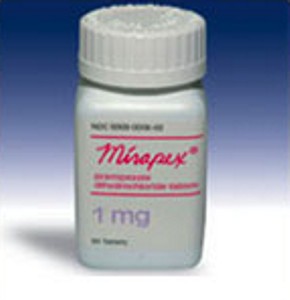.gif) VIARTIS
|
|||||
|
PARKINSON'S DISEASE NEWS |
|||||
|
|
16th October 2011 - New research PRAMIPEXOLE CLINICAL TRIAL RESULTSNeurology [2011] 77 (8) : 759-766 (W.Poewe, O.Rascol, P.Barone, R.A.Hauser, Y.Mizuno, M.Haaksma, L.Salin, N.Juhel, A.H.Schapira) Complete abstract Neurology [2011] 77 (8) : 767-774 (A.H.Schapira, P.Barone, R.A.Hauser, Y.Mizuno, O.Rascol, M.Busse, L.Salin, N.Juhel, W.Poewe) Complete abstract
Clinical trials compared the clinical efficacy in Parkinson's Disease of
the more convenient to use extended-release (ER) formulation of the dopamine
agonist pramipexole, and the standard immediate-release (IR) pramipexole.
Pramipexole is also known as Mirapex, Mirapexin, or Sifrol.
For more information go to
Mirapex
and
Mirapex ER. In the first clinical trial, both forms of pramipexole
were more effective than a placebo. Both formulations
E-MAIL NOTIFICATION : If you would like to be notified by e-mail when any new research, news reports, new books, or new resources are added to Parkinson's Disease News, please merely e-mail [email protected] with the message "subscribe". No form of identity is required. E-mail addresses are not used for any other purpose. |
|
|||
|
Parkinson's Disease News details all significant new research, news reports, new books, and new resources concerning Parkinson's Disease and those medical disorders that often coincide with Parkinson's Disease. It is compiled from an analysis of all newly published research, news reports, new clinical trials, all newly published books, and new web sites. A summary and analysis of the new research are provided, as well as links to the complete abstracts and news reports
|
|||||
.gif) |
|||||
| �2006-2011 Viartis | |||||
| 2015-09-06 12:54:15 | |||||
| [email protected] | |||||
 (extended
release and immediate release) were similarly effective in Parkinson's Disease
and were equally tolerated. In the second clinical trial, both forms of
pramipexole were more effective than a placebo. Off times decreased by up to 150
minutes per day, but a placebo achieved an 84 minute reduction in off
times, thereby lessening the actual reduction in off time to just over an hour
per day. Immediate release pramipexole was slightly more effective than
extended-release pramipexole, but otherwise, extended-release pramipexole could
be readily substituted for immediate-release pramipexole.
For
more current news go to
(extended
release and immediate release) were similarly effective in Parkinson's Disease
and were equally tolerated. In the second clinical trial, both forms of
pramipexole were more effective than a placebo. Off times decreased by up to 150
minutes per day, but a placebo achieved an 84 minute reduction in off
times, thereby lessening the actual reduction in off time to just over an hour
per day. Immediate release pramipexole was slightly more effective than
extended-release pramipexole, but otherwise, extended-release pramipexole could
be readily substituted for immediate-release pramipexole.
For
more current news go to








